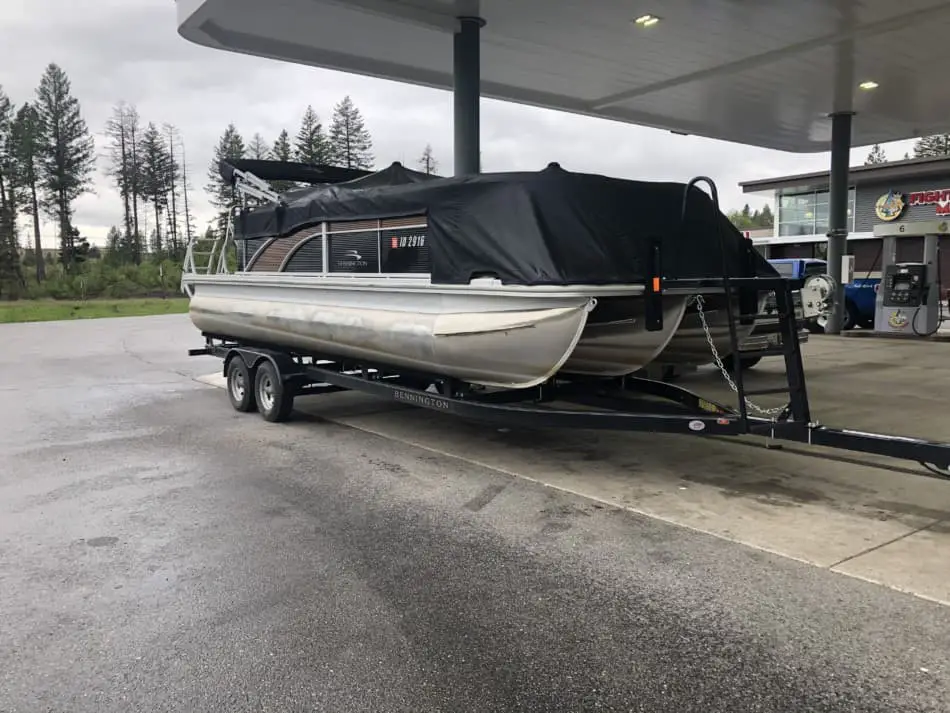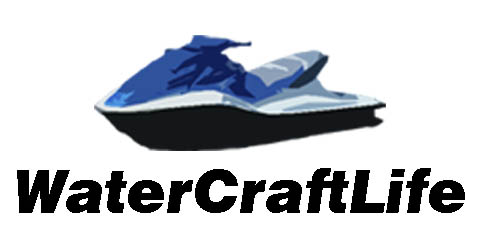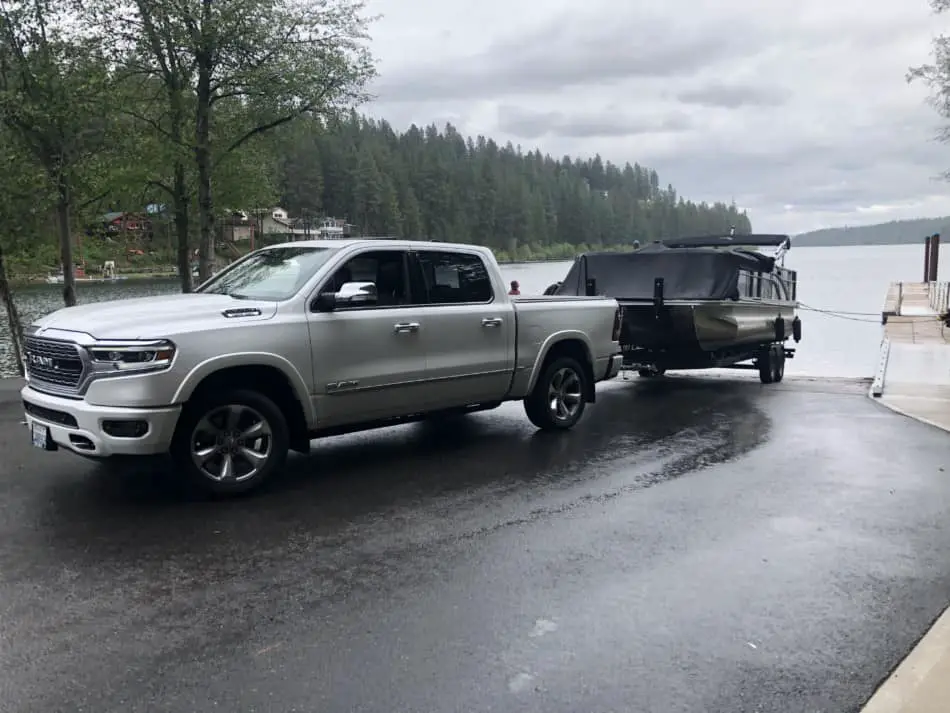Pontoons are a great way to enjoy a calm day, chilling on the water. However, in order to enjoy any amount of time on the water, you first have to be able to get there. That means having a truck that’s capable of towing your pontoon as well as any other pieces of equipment you need to get the job done.
The most important thing to remember when towing a pontoon is to have it fastened tightly and securely. You should also make sure that anything on the pontoon is strapped down so that it doesn’t fly off as your traveling down the highway and that all the equipment is working on your trailer to avoid an accident.
In this article, we’re going to look at the best way to tow your pontoon boat from one place to another. We’ll look at the type of equipment that you should have as well as how to stay safe throughout the process. It’s very easy to hurt your pontoon, your towing vehicle, or yourself if you don’t know what you’re doing.
Best Practices for Towing a Pontoon Boat
Have the Right Trailer for a Pontoon

The first thing that you’ll need to tow a pontoon boat is the right kind of trailer. You need a trailer that is easy to load, and that’s large enough to handle the weight of a pontoon. You also need one that has enough space on the bed to accommodate the width and length of your pontoon. Pontoons can be anywhere from 12 to 40 feet in length and anywhere from 7 to 10 feet wide.
You should make sure that you verify with a boating or towing professional that your trailer of choice is large enough to tow your pontoon. The best way to go about selecting a trailer is to buy a package deal where a pontoon comes with the trailer. This will ensure that the two are compatible and that you won’t have any towing problems.
Make Sure Your Towing Vehicle can Handle the Weight of the Pontoon Boat.
The next thing you’ll need to verify is that your towing vehicle can handle the combined weight of the trailer and the pontoon. The average weight of a pontoon is 2,200 pounds, but that number can increase or decrease accordingly.
If you bought a used pontoon and the owner isn’t sure about the weight, there should be an identification sticker somewhere on the boat itself. This sticker should tell you the dry weight of your pontoon not including fuel, gear, or motor. Those will need to be added separately. If you can’t find the right sticker, you should contact the maker of your pontoon and ask them directly.
You should follow the same steps with your trailer to find out how much it weighs. Trailers usually aren’t as heavy as pontoons, and the average weight is only half of what an average pontoon weighs. However, there are many different types of trailers, so make sure you know the weight of your specific one before proceeding.
One simple way to find out the weight is to tow it to a weigh station and weigh it. That will give you the actual weight
Once you know the combined weight of your pontoon and trailer, along with everything on the pontoon, check to see what your vehicle is capable of towing. The last thing you want to do is cause damage to your truck, car, or SUV by trying to tow something that’s too heavy for it.
Ensure that your Towing Equipment is Good to Go
Once you have checked in on your trailer, pontoon, and towing vehicle, it’s time to make sure everything is working correctly. You’ll need to verify that you have the right size ball and hitch combination and that your electrical connection is working. Towing a trailer that doesn’t have working brake lights and turn signals is illegal and extremely dangerous.
Secure All the Items in the Pontoon Boat Before Towing
Pontoons commonly carry more than just people when they’re out on the water. They’re meant as boats of relaxation, which means you’ll likely have towels, fishing equipment, coolers, clothes, and any other number of things on the pontoon itself.
Before towing it down the highway, you should first make sure that everything capable of flying off the back of the boat is either unloaded or strapped to the deck. The last thing you want is to get in trouble for causing an accident because something flew off your boat and struck another vehicle.
Make Sure the Pontoon is Firmly Secured
The leading cause of accidents while towing a pontoon is that it wasn’t securely strapped to the trailer. Here are the three ways that you can lose your pontoon if it isn’t properly secured.
- Off the side of the trailer while going around a curve too sharply.
- Off the back of the trailer if you accelerate too quickly.
- Off the front of the trailer and onto your towing vehicle if you slam on the brakes.
You risk causing damage to the pontoon, other vehicles on the road, and your own vehicle if you rush through this step, so take your time.
The best way to secure your pontoon is by using a heavy-duty winch and safety chain on the front and ratchet straps on the back. Make sure you aren’t stingy with the number of straps that you use because it’s the more, the merrier when it comes to strapping down your pontoon.
Once you think that you have your pontoon secured, give it a good shake from side to side to test its stability. It also wouldn’t be a bad idea to perform a practice run close to your house before hitting the open road. If anything goes wrong, it’s always better to be close to home.
Double Check Your Truck and Trailer
You can never be too careful or check your equipment too often when it comes to towing a pontoon. Here’s a list of items that you should check before embarking on your journey.
- Check to make sure the brake lights and turn signals on the trailer are working.
- Make sure the air pressure in your truck and trailer tires are at the appropriate numbers.
- Make sure you have your driver’s license, proof of insurance, and vehicle registration papers for the truck and trailer, and pontoon.
- Check the lug nuts on your truck and trailer to make sure they’re tightened.
- Double-check to make sure that the hitch is firmly secured and that the trailer is properly connected.
- Make sure you have everything you need to unload and operate the boat once you reach your destination.
Drive Slowly and Steadily
When you’re hauling a trailer of any kind, slow and steady wins the race. This is especially true when you’re hauling something on the back of that trailer, such as a pontoon. You should never exceed the speed limit and even go under it when you’re on the freeway in case you encounter any trailer sway.
Don’t Make Any Sharp or Sudden Turns.
You should also be careful not to make any sudden turns when you’re driving down the road. A pontoon on a trailer can be top-heavy, depending on how large your pontoon is. As a result, if you need to swerve to avoid an accident or to make a tight turn, it could result in capsizing your trailer and pontoon.
Also, try to avoid making any sharp turns of any sort. Trailers only have so much ability to turn before they jackknife. Attempting to make too sharp of a turn can cause damage to your truck, trailer, hitch, or all three.
Don’t Push Yourself Too Hard
A big part of keeping safety first while on your journey is not to push yourself too hard. Countless car accidents are caused because a driver fell asleep or got tired and lost their focus. A key component to staying safe on the road is to rest when you start feeling tired and don’t push yourself to the point of exhaustion. Safety should always come first when towing your pontoon!

